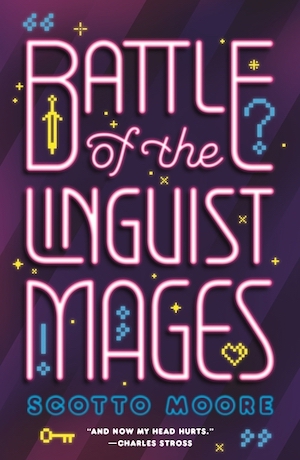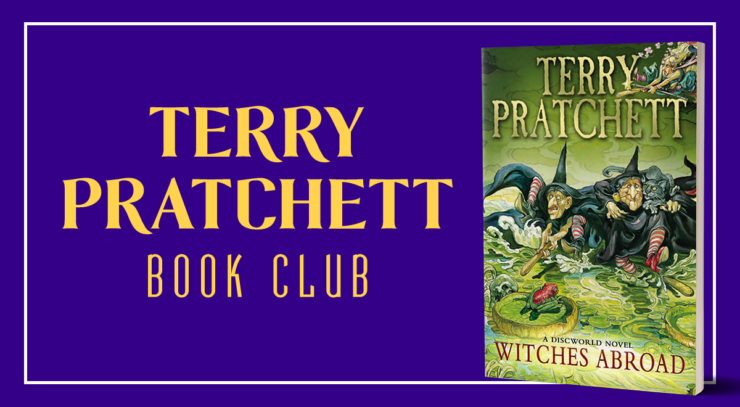Follow the yellow brick road! Not that one. A different one. We’re back with more Witches Abroad…
Summary
Magrat has a strange dream about a woman who looks like Granny in a mirror. The witches wake to find they’re being celebrated—the vampire is dead, but they believe it’s just the town’s landlord that has died. They begin journeying again, and discuss plans for an air service on a giant-type broom along the way. Nanny sends letters back to her son and family, telling them about all their encounters. There’s adventures with food, including a spot where they eat snails and get sick; there’s a running of the bulls festival that they stop by sheer force of unwillingness to move; there’s traveling by riverboat with other passengers. Nanny Ogg winds up losing all their money by gambling with the men on board, so Granny fixes to get their money back.
She goes to sit down at the boat saloon, systematically ruins every cheating measure the table of swindlers have in place, and plays them all just right to win back all their money (and then some) and Gytha’s broomstick. Magrat complains about how Granny comports herself as a witch and her refusal to use actual magic, but Nanny Ogg speaks up on her behalf, noting that Esme Weatherwax is the sort of person who is meant to be good and is generally at the mercy of those impulses despite how impossible she is. They have to leave the boat to avoid getting in trouble with the swindlers, and while flying, they notice a castle. They stop by and find everyone within is asleep. At first they think perhaps a spell by Black Aliss, who was known for these sorts of things, but on breaking the spinning wheel and waking the sleeping princess, the young girl seems to recognize Granny Weatherwax; so does everyone in the castle. They have to run away despite helping these people out, and Granny begins muttering to herself about people who force happy endings, and how it’s impossible to do.
Buy the Book


Battle of the Linguist Mages
They run into a little girl next, who is bringing treats to her sick grandmother. Having been warned against witches, Magrat tells the girl that they’re fairies, and distracts her by doing magic with her wand while Nanny and Granny go to see what’s become of the girl’s grandmother. They get the woman to let them in by telling her they’re fairies and insist that she go up to her attic to keep out of the way. Nanny then takes her place in the bed and Granny hits the approaching wolf over the head with a frying pan. She enters its mind and finds the creature has been completely destroyed by a magical impulse to try and be human. The wolf wants to die, so when Magrat and the girl arrive with a woodcutter, they ask him to kill the wolf, who readily lays itself out on the block. Granny insists the wolf be buried. She also insists that the woodcutters not leave this poor grandmother alone (they’re all scared that she might be a witch), but that they build her a new cottage close to town and see that she’s taken care of.
Granny and Magrat get into another fight about what being a witch is about, this one worse than the last. They stop speaking to each other. The trio find a yellow brick road leading to Genua, and have to walk the rest of the way. A farmhouse drops on Nanny’s head, which she is only spared from due to the reinforced willow in her new hat. Dwarfs show up singing a song about it and asking for Nanny’s boots for reasons they can’t quite understand. Granny distracts them by informing them that they have real quality dwarf bread, which lets them get underway again. In the city, Lillith concerns herself with the progress the group is making and tells two creatures of her own making (who don’t have voices yet) that they must let the witches speak to Ella.
Commentary
The themes and shape of the story begin to firm up in this section as the witches encounter fairy tale after fairy tale. The fight simmering between Esme and Magrat ties into Pratchett’s opening, the insistence that stories are not things shaped by people, but parasites that we are powerless to stop. There’s an excellent play-within-a-play quality to the whole thing because he’s forcing the witches to be a part of a story in order to tell this story about how stories aren’t enough, and about how stories can be used as cudgels and how our desire for narrative—a species-wide affliction—can often warp perception for the worst.
It’s the most obvious within the Little Red Riding Hood section, which begins with Nanny making the point that no one ever cares what happens to the poor defenseless old woman in these stories, and ends with the death of a creature who never intended to be anyone’s villain at all. This is the story that Pratchett uses to point out where our understanding of narrative and archetype is, in fact, a very dangerous thing. Granny Weatherwax questions one of the woodcutters about whether anyone ever comes to check on this little girl’s grandmother, and is told of course they don’t because she lives too far out in the middle of nowhere—and more importantly, she must be a witch. She’s a witch because she has a hooked nose and she lives alone and she just seems creepy to these men, so obviously, she deserves none of their consideration or kindness.
And yes, most of these problems are being caused by someone she knows, but this is ultimately a stand-in for a real-world problem. When people say that the way stories portray groups and types of people matters, this is really what they’re talking about. It’s not that everyone automatically believes that all fiction is founded in truth, and therefore tropes and stereotypes must be real… but some people will think they are. Maybe too many. And then you have able-bodied young men believing that the old woman who lives in the woods is a disgusting hag who might curse them, when she’s really just a poverty-stricken grandmother who should have a community that checks in on her and takes care of her.
Pratchett uses fairy tales in this instance because they are a pared down (for lack of a better term—this is not me saying that fairy tales are simplistic) type of story, a clarified form that gets repeated often and rarely over-altered. So perhaps the real point here is not that stories are somehow evil, but that stories in their unaltered, uncomplicated forms can truly do damage. We should care about Little Red’s grandmother as much as we care about her. We should care about the wolf, too, and what brought him to this story in the first place. In this case, we should care that the imposition of story upon his person led him to beg for the end of his life.
Granny’s anger in all of this is ultimately more understandable than Magrat’s is because the younger witch isn’t really arguing about what she thinks she’s arguing about. Magrat believes that she’s defending her desire to learn and grow, and Esme may have a personal issue with new-fangled ideas, but her beef comes with the implication that life comes with any form of happy ending. She’s right that it doesn’t, and that imposing the need for happy endings onto anyone is a form of tyranny.
There’s a part of me here that wants to really make the connection between the idea of forcing happy endings onto people with the “positive thinking” brigade as well. Whatever works for you personally is what works for you, but nothing makes me more ill than people who insist to me that we can fix our problems by smiling more and believing that good things will happen. It’s actually been shown in scientific studies that imposing those “happiness” parameters on people who don’t think that way only makes them more miserable. And that’s essentially what the witches are encountering here: A forced sphere of happy endings is ruining people’s lives and making the general population on the path to Genua sad, frightened, or consigned to eternal slumber.
The thing that sort of caught me as I was considering Lillith’s role in all of this is that (you’ll have to forgive me—I’m about to invoke Shrek) she’s basically the antithesis to a character like Lord Farquaad. Instead of being a person who wants magic and story removed from her sight, she wants people to enact their roles correctly. And she’s far more frightening as an antagonist because that manner of cruelty, while overblown, is more realistic within human experience. While Shrek uses the narrative as a metaphor for general prejudice within society, what Lillith does is the sort of thing you might encounter from any angle in life: from parents, from neighbors, from your boss. She’s just doing it on a far grander scale, making her an able villain for a whole novel.
Asides and little thoughts:
- I do like the bit where the trio just free-associates the concept of airline travel, but on the trunk of a big tree.
- Fairy Hedgehog. Have I mentioned that Nanny Ogg is a treasure?
- The “some people need some heart,” “some people need a brain,” “Nanny Ogg needs a drink” exchange is one of the best references to the Tin Man, Scarecrow, and Lion that I’ve ever read.
Pratchettisms:
Magic was there to make life better. Magrat knew this in the pink fluttering boudoir of her heart.
Falling asleep during the day was something only old women did, and Granny Weatherwax was an old woman only when it suited her purposes.
Magrat leaned down and set her face in the idiot grimace generally used by adults who’d love to be good with children and don’t stand a dog’s chance of ever achieving it.
In the middle of the garden was what had to be a thatched cottage because no one would build a haystack that badly.
There’s a certain freemasonry about grandmothers, with the added benefit that no one has to stand on one leg or recite any oaths in order to join.
“Pray?” thought Nanny. Someone has ended a sentence with “pray?” That’s like that bit when someone hits someone else with a glove and then throws in on the floor. There’s no going back when someone’s ended a sentence with “pray?” But she tried, anyway.
Next week we read up to “And if I had a face like that I’d never wear red…”










